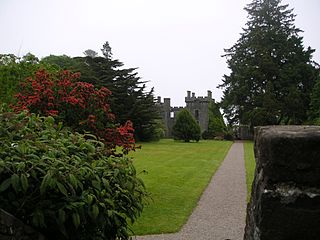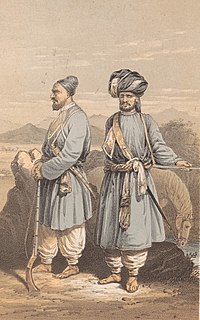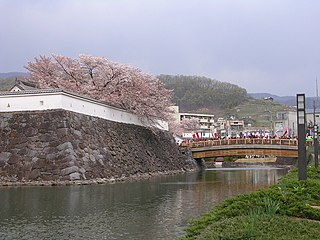
Armadale is a village near the southern end of the Sleat peninsula on the Isle of Skye, in the Highland council area of Scotland. Like most of Sleat, but unlike most of Skye, the area is fairly fertile, and though there are hills, most do not reach a great height. It looks out over the Sound of Sleat, to Morar and Mallaig.

The Khasi people are an ethnic group of Meghalaya in north-eastern India with a significant population in the bordering state of Assam, and in certain parts of Bangladesh. The Khasi people form the majority of the population of the eastern part of Meghalaya, that is Khasi Hills, constituting 78.3% of the region's population, and is the state's largest community, with around 48% of the population of Meghalaya. They are among the few Austroasiatic-speaking peoples in South Asia. A cultural tradition of the Khasi people is that they follow the matrilineal system. Under the Constitution of India, the Khasis have been granted the status of Scheduled Tribe.

The Merri Creek is a waterway in southern parts of Victoria, Australia, which flows through the northern suburbs of Northcote. It begins near Wallan north of Melbourne and flows south for 70 km until it joins the Yarra River at Dights Falls. The area where the creek meets the river was traditionally the location for large gatherings of the Wurundjeri people and is suspected to have been the location for one of the earliest land treaties in Australia between Indigenous Australians and European settlers.

The Mizo people are an ethnic group native to the Indian state of Mizoram and neighbouring regions of Northeast India. The term covers several related ethnic groups or clans inside the Mizo group.

The Salt Range is a mountain range in the north of Punjab province of Pakistan, deriving its name from its extensive deposits of rock salt. The range extends along the south of the Potohar Plateau and the north of the Jhelum River. The Salt Range contains the great mines of Khewra, Kalabagh and Warcha which yield vast supplies of salt. Coal of a medium quality is also found.

Carmel Valley is a suburban planned community in the northwestern corner of San Diego, California, United States. The community is composed of commercial offices, residential units, hotels, retail stores and restaurants.

The Water of Fleet is a river in Scotland flowing into Fleet Bay on the Solway Firth. Its two tributaries are the Big Water of Fleet, which begins around Loch Grannoch, and the Little Water of Fleet. The river flows through Gatehouse of Fleet before meeting the sea.
Katoch is a Chandravanshi Rajput clan. Their traditional area of residence was in the Trigarta Kingdom, based at Jalandhar and at Kangra Fort in the Indian state of Himachal Pradesh. They claim descent from the Trigarta dynasty mentioned in the Mahabharata.

The Turi or Torai are a tribe of the Pashtun people, inhabiting the Kurram Valley, in Kurram Agency in the Federally Administered Tribal Areas of Pakistan, with a smaller number living across the Durand line in the Paktia province of Afghanistan. They speak Pashto and are adherents of the Twelver Shia sect of Islam. Unlike the majority of Pashtun tribes, The Turis predominantly follow the Shia sect of Islam, because of this and other reasons and land history they are usually tensions between them and the Sunni Pashtun tribes; Orakzai and Bangash tribe who also live in Kurram Valley.

Kōfu Castle was a Japanese castle located in the city of Kōfu, Yamanashi Prefecture, in the Chubu region of Japan. The site has been protected as a National Historic Site since 2019. The castle is also known as Maizuru Castle, and the present-day surroundings are called Maizuru Castle Park.
The Afemai, also spelled Afenmai, are an ethnic group living in the northern part of Edo State, South-South geopolitical zone of Nigeria. Afemai people occupy six local government areas of Edo state: Etsako West, with headquarters in Auchi, Etsako Central, Etsako East, Owan East, Owan West and Akoko Edo. These make up the Edo-North Senatorial District.
Piera Fatehial is a village and union council of Chakwal District in the Punjab Province of Pakistan. It is a village of Talagang Tehsil, the word "Pira" is from Pothari meaning sitting or chair, while "Fatehial" is a clan of the Awan Tribe.
Owan East is a Local Government Area of Edo State, Nigeria. The headquarters is in the town of Afuze. The Owan East Local Government Area comprises 69 towns/villages made up of eight clans.
Tiwa is an ethnic group mainly inhabiting the states of Assam and Meghalaya in northeastern India. They are also found in some areas of Arunachal Pradesh, Manipur and Nagaland. They are recognized as a Scheduled tribe within the State of Assam. They were known as Lalungs in the Assamese Buranjis and in Colonial literature and in the Constitution of India, though members of the group prefer to call themselves Tiwa. Some of their neighbours still call them Lalung.

Yuzuki Castle was a former Japanese castle located in the city of Matsuyama, Ehime Prefecture, Japan. During the Muromachi period, it was the stronghold of the Kōno clan, who ruled Iyo Province under the Muromachi shogunate. The ruins of the castle were area designated a Natuional Historic Site.
Afridi Adam Khel is one of the 8 clans of the Afridi tribe that originated in the Pashtun region of modern-day Afghanistan and Pakistan.
Kala Khel is a clan of Tirah Adam Khel.Kala Khel Area adjacent to FR Peshawar and FR Kohat is a part of Khyber Agency administratively whereas on the Topo - Sheet of Survey of Pakistan, it has been shown as the part of Peshawar Division and Kohat Division. Adam Khel is a sub-tribe of Afridi that has originated from the Karlanee or Karlani group of Pashtuns. The Kala Khel clan of Tirah Adam Khel inhabits in FR PESHAWR & FR KOHAT region and in Bara and Torghar as well. It can be found on Google Maps at 33.728623N,71.55256E and Tirah valley of Khyber agency at 33.73N, 71.01E.
Wadi al-Taym, also transliterated as Wadi el-Taym, is a wadi that forms a large fertile valley in Lebanon, in the districts of Rachaya and Hasbaya on the western slopes of Mount Hermon. It adjoins the Beqaa valley running north to south towards the Jordan valley where it meets the northwest corner of Lake Huleh. Watered by the Hasbani river, the low hills of Wadi al-Taym are covered with rows of silver-green olive trees with the population in the area being predominantly Druze and Sunni, with a high number of Christians, mostly Greek Orthodox. Wadi al-Taym is generally considered the "birthplace of the Druze faith".
Igue festival is a celebration with its origin in the Benin Kingdom of Edo State, Nigeria. One tradition states that the festival date coincided with the marriage of Ewuare to a wife named Ewere. Celebrated between Christmas and New Year, the festival includes the Oba's blessing of the land and his people. During the Igue ritual season, the Oba is prohibited from being in the presence of any non-native person.
Himberrong is a clan of the Anēwan Aboriginal tribe of what is now known as the New England Tablelands region in northeast New South Wales. Part of their traditional land, once an Aboriginal reserve called Inglebah, is now a heritage Aboriginal Place.









